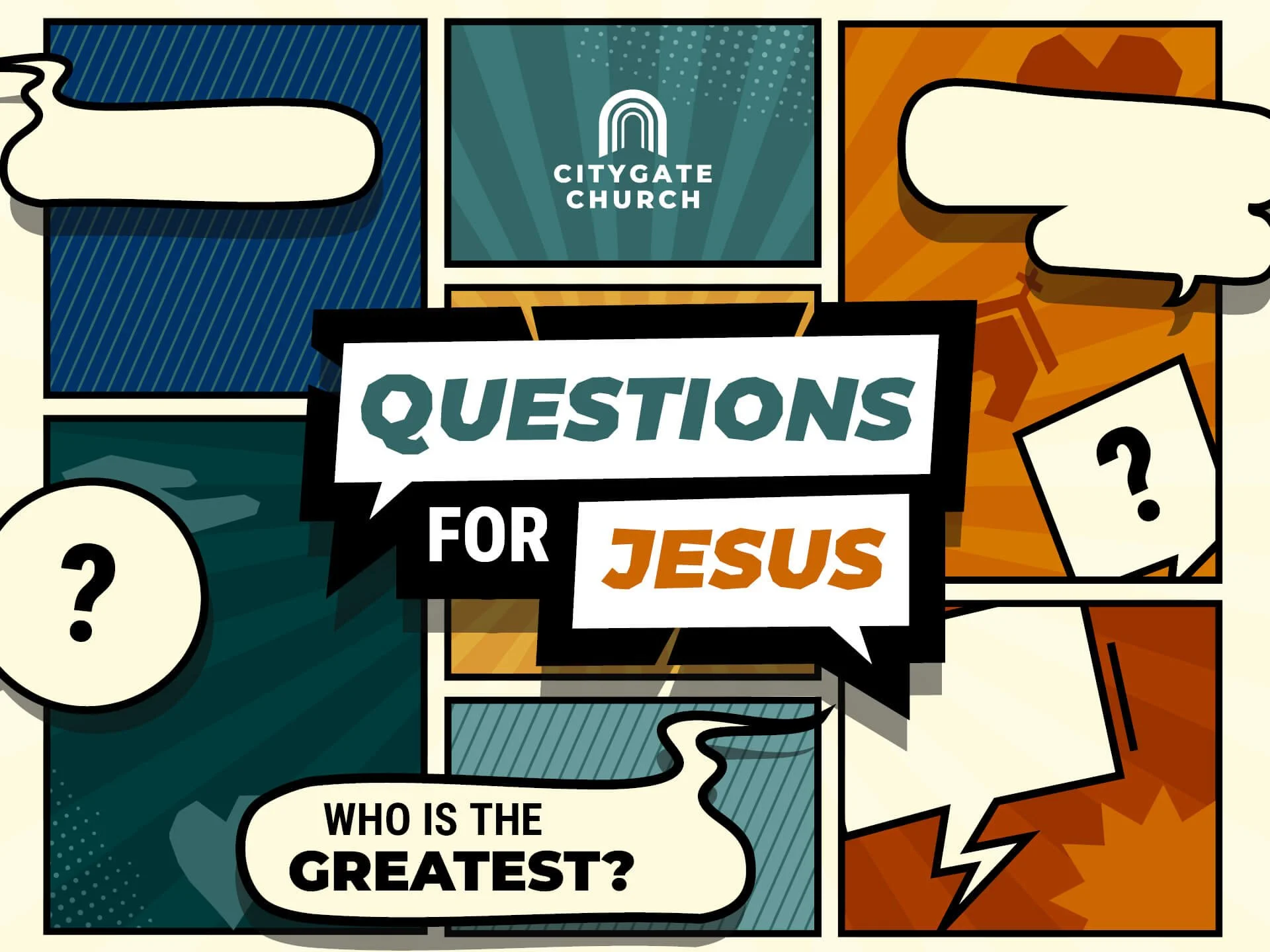Questions for Jesus | Are You Worthy of My Devotion?
About this series:
In each of the gospels we find Jesus asking questions of his disciples, the crowds and his opponents. And we also find Jesus being asked questions - by his disciples, the crowds and his opponents. Here, we will take 10 questions people asked of Jesus, the first from Luke’s gospel to set up the series and then the rest from Matthew’s gospel.
As well as working through the specific passages, we will aim to encourage people to consider what questions they would like to ask Jesus. The hope is that by looking at Matthew’s gospel in this way, we will see more clearly who Jesus is, be inspired to follow him and learn to be honest about our own questions as we grow to become more like him.
About this talk:
This story is included by Mathew, Mark and John (cf. Mark 14:3-9; John 12:1-8). There are different views as to whether the similar account in Luke 7:37-39 is a separate event, given that in Luke’s account it is located earlier in Jesus’ ministry, that Jesus is having dinner at a Pharisee’s house and that he is anointed by “a woman in that town who lived a sinful life.”
Matthew says “Jesus was in Bethany in the home of Simon the Leper,” v 1, just a few days before the crucifixion, while the religious authorities “schemed to arrest Jesus secretly and kill him,” v 6. Jesus seems to have been staying in Bethany during the week leading up to the Passover Festival. We do not know the precise identity of Simon, but various options are offered:
He may no longer have been alive, having died of leprosy, but the meal is taking place in what is still known as his house.
If he is still alive, Simon was a former leper, possibly someone Jesus healed, otherwise the others would surely have been unwilling to be guests in his home.
Given that in John’s account Lazarus and his two sisters (Mary and Martha) were present, it is possible that Simon is also part of that family, their father or brother.
Matthew does not name the woman in v 7, though she may well be the Mary named in John 12. Whoever she is, her actions are shocking and memorable. We can assume that she has previously heard of Jesus and responded to his offer of forgiveness, possibly recognising him to be the Messiah, given that anointing in such ways was one part of recognising kingship in Old Testament times.
Matthew says it was the disciples collectively who asked “Why this waste?” Mark says it was “Some of those present,” while John identifies Judas as the one who complains, saying “Why wasn’t this perfume sold and the money given to the poor? It was worth a year’s wages.” John then explains “He did not say this because he cared about the poor but because he was a thief; as keeper of the money bag, he used to help himself to what was put into it.” Which raises the interesting question of why Jesus would have allowed such a practice to continue.
Jesus is having a meal (“he was reclining at the table”) when the woman approaches him, breaks the neck of the jar (see Mark 14:3) and pours the very expensive perfume on his head. The extravagance of this woman’s devotion is shown by Judas’ horror that “it was worth a year’s wages.” Simply translating that into modern currency helps to see just what an extraordinary gesture this was. Both Mark and John say the perfume was made of pure nard, ‘a perfume made originally from a plant growing on the Himalayas’ (Biblehub.com).
In contrast to the objections made by his disciples, Jesus declares her actions as “a beautiful thing to me.” What they see as waste, he sees as an act of devotion, in part because “the poor you will always have with you, but you will not always have me.” He doesn’t at all mean to devalue the poor, of course, but simply to recognise that there will be plenty of opportunity to serve the poor and meet their needs, but not long left to honour him.
He then says “When she poured this perfume on my body, she did it to prepare me for burial.” Clearly they had no understanding of what was soon to come (and, presumably, neither did she), but he sees in this act a precursor to his burial, just as Joseph and Nicodemus (John 19:39-40) and the women would later do (Luke 23:56-24:1).
And finally Jesus says “Truly I tell you, wherever this gospel is preached throughout the world, what she has done will also be told, in memory of her.” Which has of course, been realised through the record of the gospel writers and so it remains a supreme act of devotion to Jesus during his lifetime. Because Jesus is Lord, because of who he is and what he has done for us, he deserves nothing less than our complete devotion, even if to others that may sometimes appear like a waste. And certainly it can do: to family, friends, neighbours, work colleagues, even other Christians when we make certain decisions to put Jesus first, however costly that may be. Anytime we put him first, whatever the cost, we can be assured that to him it will be “a beautiful thing.”
Audio only
Discussion Questions
Welcome and Prayer (5 min)
Open with a short prayer asking God to speak clearly and personally to each person.
Ask: "What are some words that we might use as synonyms for devotion?"
Part 1: Read the Passage (10 min)
Matthew 26:6–13 – The Anointing at Bethany
Observation prompts:
What stands out to you about the woman's actions?
What does Jesus say in response to the criticism?
How does this story make you feel?
Part 2: Devotion Defined (5 min)
Key Idea: Devotion is love and loyalty in action. It's sacrificial, costly, and intentional.
A few things around Devotion:
"Devotion leads to action. It's not passive."
"He's worthy because of what He's done but also because of who He is."
"People will see radical devotion as foolishness or excessive."
Ask:
• Why do you think people saw her actions as wasteful?
• Do you know of someone who exhibited Radical Devotion - even in the eyes of Christians?
Part 3: Devotion Today – Time, Talent, Treasure (10 min)
Challenge: Are we giving Jesus our first or our leftovers?
Read the questions below as a gentle challenge to the group, and then there are 3 practical reflection questions for people to share in smaller groups.
Time
Do I regularly give time to prayer, Scripture, worship, serving others?
Is my calendar shaped around devotion to Jesus, or is He squeezed in?
Talent
Am I using my gifts and strengths for His kingdom or just for my own success?
Do I bring my best to His service, or just what's convenient?
Treasure
Do I trust Jesus enough to be radically generous?
Do I give out of devotion or out of guilt/obligation?
Reflect and Share in smaller groups
"What's one way I could give Jesus more of my time this week?"
"How might I offer my abilities more fully in devotion to Jesus?"
"Have I ever given something costly to Jesus? What did that teach me?"
Part 4: Living It Out (5 min)
Quote from notes:
"Do we measure our success by what we have achieved or what we have surrendered?"
Reflection Questions (Pick 1–2 to discuss or journal quietly):
What's something that might be taking the place of Jesus in your heart (idol)?
In what area—time, talent, or treasure—is God asking you to grow in devotion?
How can I show radical love for Jesus this week that others might even call "foolish"?
Challenge Verse:
Romans 12:1 – "Offer your bodies as a living sacrifice… this is your true and proper worship."
Closing Prayer (2–3 min)
Invite people to offer a short prayer of commitment in one area: time, talent, or treasure.
Optional Follow-Up
Ask group members to:
Text one another midweek to check in on what they committed to.
Reflect or journal on "Jesus is worthy of my __________."












